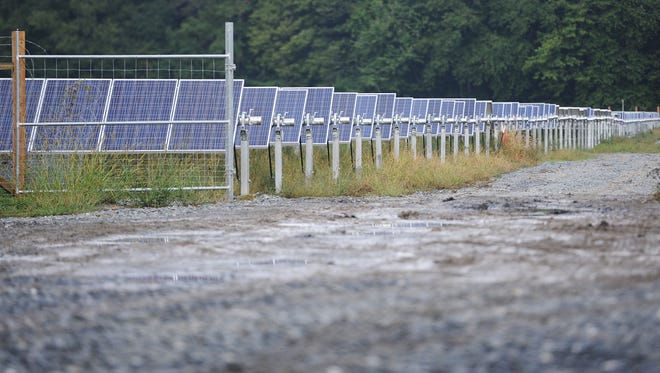Future solar farms could be slowed by Accomack regulations

Renewable energy developers could face more red tape coming to Accomack County in the future.
County officials voted Wednesday, Jan. 19 to remove utility-scale solar and wind farms from the list of potential uses allowed in the county’s Agricultural Zoning District— but not before approving one solar farm that has been in the works since 2016.
The board of supervisors gave SunTec Solar Solutions the green light for plans to build a 20-megawatt solar project on Van Kesteren Farms in Tasley, but similar projects will need to be outside the agricultural ] zone in the future.
“I think it gives us an extra layer of protection,” Supervisor Grayson C. Chesser said of the changes to county law.
“Just because you take it (utility-scale solar and wind farms) out of ag (zoning) does not mean that somebody cannot come back and have it rezoned,” Chesser said. “If it’s a project that we want, and we think is a good project, we can consider rezoning it.”
Board members agreed SunTec’s is such a project.
Proposed by a local family last year, the solar farm plans to marry renewable energy with agriculture by bringing a flock of Hog Island sheep to graze among nearly 200 acres of photovoltaic panels.
BACKGROUND: Officials: Solar takes farmland, evades fair tax share
The heirloom breed originated on nearby Hog Island and is listed as “critical” under The Livestock Conservancy’s endangered breeds list.
Supervisor C. Renata Major praised SunTec for its plans for “mixing solar—something that’s of the future, per se—with something that’s very dear to us in Accomack County,” traditional agriculture.
Before changing its zoning laws, Accomack listed utility-scale solar farms as a “conditional use” for land in its agricultural district, meaning projects in the zone could progress only with the board of supervisor’s approval.
SunTec underwent months of scrutiny earning that approval, working with county officials to design a buffer around the solar farm and showing that tax revenue lost to solar farm exemptions would be made up through new real property taxes.
Though the board unanimously approved the project Wednesday, it drew attention to the possibility that solar and wind farms could displace agriculture in the county.
To avoid that, the board approved in a 7-to-2 vote Wednesday an amendment that removes utility-scale solar and wind farms from the list of conditional uses for agricultural lands in the county.
Instead, they will have to plant their projects in general business and industrial areas, or seek rezoning of agricultural lands.
That takes a large portion of the county’s flat, cleared land—that best suited to renewable energy production—off the table.
“There’s a lot of land in this world that is fit for grazing, but there is not a lot of land that is fit for cropland,” Chesser said.
But not all farmers agree with the changes to the ordinance.
READ MORE: Meet Md. solar industry's newest foe: farmers
Steven Van Kesteren, co-owner of Van Kesteren Farms, said devoting a small portion of his farmland to solar energy production simply makes sense.
“The whole reason for it is just to diversify your income,” Van Kesteren said. “It gives us a little push against agriculture prices.”
SunTec worked to show that solar projects and agriculture aren’t mutually exclusive when designing its Tasley project.
“We want to show to the county that these things aren’t so black and white. They can exist together,” company minority shareholder Dennis Nordstrom said.
The changes to Accomack’s Agricultural Zoning District still allow farmers to build private solar and wind projects on their property, but county attorney Cela Burge cautioned that these projects “are identified very specifically in the zoning ordinance.”
Utility-scale projects— those now barred from the agricultural district— are defined as that with a capacity of at least one megawatt to provide electricity to the local utility provider.
READ MORE: More Shore homeowners using residential solar energy
Chesser pointed to SunTec’s as an example of a utility-scale solar farm that could gain approval under the updated law, but some supervisors said the changes could stifle growth of renewable energy in the county.
“When the board first started this (ordinance amendment), it was trying to protect farmland,” Supervisor Donald L. Hart Jr said. “What you see in this project— the SunTec project… is beautiful.”
“They’ve shown that it (solar production) doesn’t have to be an eyesore— that it can be done in a good way, in an agricultural way,” he said.
“I have problems, too, just totally removing solar out of agricultural districts. I just have a problem with that, given what I’ve seen tonight,” Major said.
SunTec’s solar farm is slated to be up and running by 2019 “with a little luck,” Nordstrom said in an interview last year.
The project should generate enough energy to power roughly one quarter of the homes in Accomack County and will create local jobs, he said.
Accomack’s planning commission is working to create a new plan for utility-scale renewable energy projects now that they are barred from the Agricultural Zoning District, the county’s planning director Rich Morrison said.